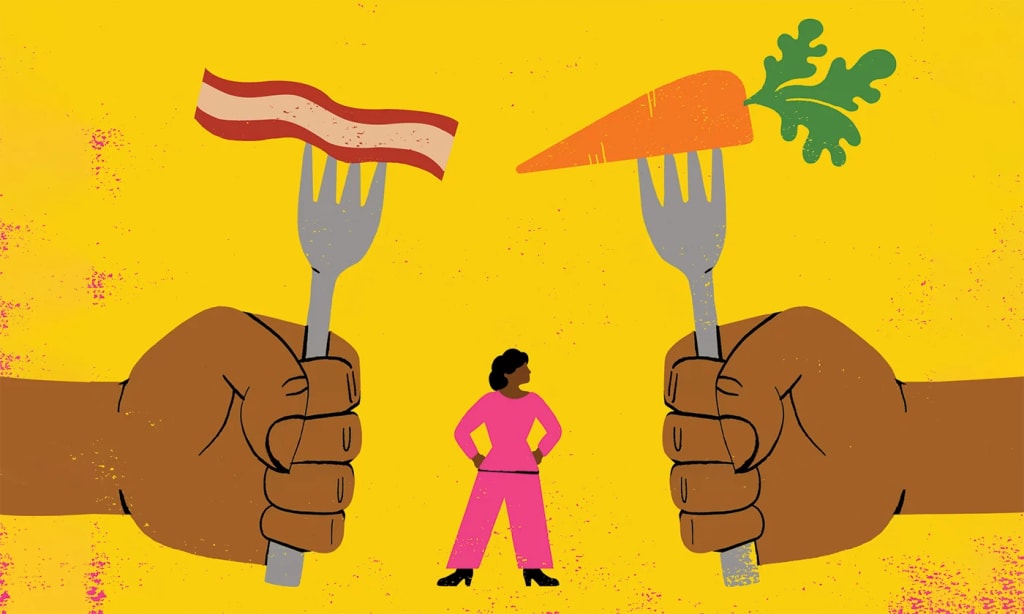The Magic of a Meatless World: A Sustainable Future
What will happen if we don't eat meat?

Introduction:
In a world where livestock populations outnumber humans fourfold, and the weight of farmed cattle dwarfs that of all wild mammals combined, it's intriguing to imagine what would happen if a hypothetical "wizard of meatless dining" waved a magical wand to eliminate meat and our desire to consume it. The consequences of such a transformation would ripple through our society for days, years, and even millennia, with profound effects on our environment, health, and cultures.
The Immediate Impact:
Overnight, our planet would experience a dramatic reduction in food-related greenhouse gas emissions—approximately a 63% decrease. Gone would be the roughly 70 billion chickens, 1.5 billion pigs, 300 million cattle, and 200 million tons of fish and shellfish that are processed for consumption each year. The initial challenge would be to find alternative sources of protein and essential nutrients.
A Shift in Diet:
In response to this sudden change, our demand for fruits, vegetables, and legumes would skyrocket. Nutritionists widely agree that such a diet can provide all the necessary nutrients for a healthy life. However, initially, there may not be enough of these foods to meet the increased demand, causing produce costs to soar. In regions like Mongolia, where vegetable cultivation is challenging, the abrupt absence of meat could leave people with limited food options.
Cultural Transformations:
Cultures deeply rooted in meat-based traditions would face profound transformations. Communities reliant on meat, such as salmon-eating tribes in the Pacific Northwest of the United States, would lose not only sustenance and livelihoods but also an integral component of their religion. Tens of millions of anglers, whose livelihoods were already threatened by dwindling fish populations, would lose their work.
Economic Shifts:
As the meat industry collapses, many households in developing countries would scramble for income previously derived from livestock farming. Some meat producers might transition to agricultural crops, reducing the risk of respiratory diseases associated with livestock production. As crop agriculture expands, prices would eventually stabilize, making vegetarianism more affordable than meat-eating in most countries.
Environmental Benefits:
One of the most significant advantages of a meatless world is the reduced demand for land and water. Without the need to raise animals for meat, the land previously used for growing animal feed becomes available for other purposes. This shift, combined with reduced greenhouse gas emissions, helps mitigate climate change and prevents millions of deaths from diseases linked to red meat consumption.
Biodiversity and Evolution:
Over time, as habitat loss, pesticide use, and other agricultural pressures decrease, global biodiversity would rise. Amazonian birds would have more forest to fly over, and fewer cheetahs would be hunted for encroaching on livestock. Insect populations would thrive as natural areas expand, leading to higher yields for insect-pollinated crops. Humans in traditionally vegetarian regions may even evolve genetic adaptations to process plant-based fats more efficiently.
The Reality:
While the scenario of a meatless world might seem like a magical solution to many of our problems, it remains a fantasy. Global meat consumption continues to rise, posing significant challenges to our climate and environment. Even if we were to cease burning fossil fuels, the combination of business-as-usual food systems and a growing population would still drive global temperatures above 1.5°C by the end of the century.
Conclusion:
The idea of a meatless world, brought about by a wizard or not, illustrates the profound potential benefits of reducing meat consumption. It highlights the urgency of addressing the environmental impact of meat production, particularly beef and dairy, which contribute disproportionately to food-based emissions. By reducing our consumption of these products, we can work toward a more sustainable and healthy future, all without the need for a touch of magic.
About the Creator
Elif Talib
Elif: Aspiring article writer with a curious mind, a passion for storytelling, and a commitment to learning. Excited to embark on this writing journey and share insightful content with readers.






Comments
There are no comments for this story
Be the first to respond and start the conversation.